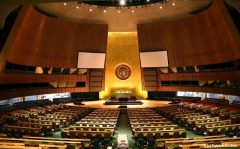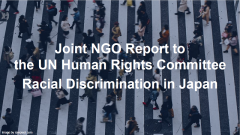News
-
Online Event: Re-thinking for the Elimination of Racial Discrimination in the face of Pandemic (17 March)
Japan NGO Network for the Elimination of Racial Discrimination, which IMADR is the secretariat of, will hold an online event “Re-thinking for the Elimination of Racial Discrimination in the Face of Pandemic” on 17 March at 9:30 (GMT). It will be held in commemoration of the International Day for the Elimination of Racial Discrimination. Simultaneous interpretation in English and Japanese will be available. Register to receive a Zoom link to join the event.March 10, 2021 -
Statement: “Problem of Ramseyer’s Article on Buraku: from the Perspective of Human Rights and Non-Discrimination”
Alarmed by the article “On the Invention of Identity Politics: The Buraku Outcastes in Japan” written by Professor Mark Ramseyer of Harvard University, IMADR issued a statement to clearly state our views on the article from the human rights and non-discrimination perspective. The statement has been supported by the International Dalit Solidarity Network (IDSN) and Minority Rights Group International (MRG), with whom we have worked together for minority rights. Please read and endorse the IMADR statement. You can add your voice by filling the form below. Your signature will be published on our website in due course. It may start small, but we can come together to make it a […]March 8, 2021 -
Promoting reconciliation, accountability and human rights in Sri Lanka (HRC46, 2021, OS)
IMADR delivered the oral statement on “Promoting reconciliation, accountability and human rights in Sri Lanka” at the 46th session of the Human Rights Council. Whole text can be read below or download here. ——— Oral Statement: 46th session of the Human Rights Council Item 2: Interactive Dialogue on the OHCHR report on Sri Lanka 24 February 2021 Madam President, We welcome the High Commissioner’s report on Sri Lanka. Human rights in Sri Lanka are now threatened by the centralisation of executive powers and weakening of the independence of the judiciary and key commissions including the Human Rights Commission and the Office on Missing Persons (OMP). With the rubber-stamping Parliamentary Council, […]February 25, 2021 -
CERD 103rd session: Belgium (April 2021)
At its 103rd session from 19th to 30th April 2021, the UN Committee on the Elimination of Racial Discrimination (CERD) will carry out its activities online including the followings. Online review of Belgium (20 – 21 April) Adoption of lists of issues prior to reporting (LOIPRs) on Gabon, Lesotho, Maldives and Tunisia Assessments of follow-up reports of Iceland, Jordan, Mexico, Poland and the State of Palestine Civil society organisations (CSOs) are encouraged to submit information on the situations of racial discrimination in these countries. Please get in touch with us if you are preparing an alternative report or planning one on the abovementioned countries. Please also share this information widely with […]February 22, 2021 -
Open NGO letter for UN Human Rights Council’s actions on Sri Lanka
February 22, 2021 Re: Coalition of 22 Organizations Calls for New UN Human Rights Council Resolution to Protect Human Rights, Justice, and Accountability in Sri Lanka To the Member States of the Human Rights Council: We, the undersigned organizations, urge the Member States of the Human Rights Council to pass a strong resolution at the 46th Session, affirming an international commitment to protect human rights and justice in Sri Lanka, with a particular focus on victims. The deteriorating human rights and accountability context in Sri Lanka is documented in detail in the High Commissioner for Human Rights’ damning January 2021 report as well as a joint assessment released by ten […]February 22, 2021 -

Newsletter E-CONNECT No.34 is out
On the 19th of December, we released our new issue of E-CONNECT. If you have not subscribed to our newsletter, you can do it from here! Back number is also available. Feature story New UN expert guidelines on preventing and combating racial profiling The General Recommendation No.36 on “Preventing and Combating Racial Profiling by Law Enforcement Officials” was recently adopted by the UN Committee on the Elimination of Racial Discrimination (CERD). It clarifies the human rights obligations under the Convention as well as a definition of racial profiling. The Committee paid a particular attention to racial bias and discrimination in algorithmic profiling, highlighting one of the major challenges posed by […]December 21, 2020 -
Joint Statement on International Migrants Day: Stop the Pandemic of Racism in the time of the COVID-19 Pandemic
Joint Statement of the Organising Committee for East Asia Regional Consultation Stop the Pandemic of Racism in the time of the COVID-19 Pandemic On the occasion of the International Migrants Day, 18 December, the Organising Committee for East Asia Regional Consultation urges the governments of East Asian countries/territory to take effective measures to prevent institutionalised racial discrimination against migrants including migrant workers and to strengthen legal protection of migrants against all forms of racism in the time of the pandemic crisis. East Asian region is the home and workplace of at least 10 million migrant, indigenous and minority populations. The East Asian myth of ‘homogenous society’ has never represented the […]December 18, 2020 -
Joint NGO response to the report on the state of the UN human rights treaty body system
In response to the report submitted to the UN General Assembly by Morocco and Switzerland, the co-facilitators for the process of the consideration of the state of the UN human rights treaty body system, over 150 NGOs, including TB-Net, jointly presented the view on the recommendations in the report which we consider fundamental for the strengthening of the system. The joint NGO response also includes our recommendations to States, the treaty bodies, the Office of the High Commissioner for Human Rights (OHCHR), and the President of the 75th session of the General Assembly on how to move forward on the implementation of these recommendations. THE ONGOING BUSINESS OF STRENGTHENING THE […]December 17, 2020 -
Summary Report – Racism in East Asia (2020)
On the occasion of the Human Rights Day, the Organising Committee for East Asia regional consultation published the Summary Report on Racism in East Asia. It is an outcome document of the online series in examining the situation of racialised communities in Hong Kong, Japan and the Republic of Korea in the time of the COVID-19 pandemic. The report contains the following contents. Executive summary Background information Institutional racism in East Asia’s COVID-19 responses The Impact of COVID-19 on migrant workers Racism and domestic law The report is available in English, Japanese and Korean.December 10, 2020 -
UN: Summary of the CERD 102nd session
On the 24th of November, the UN Committee on the Elimination of Racial Discrimination (CERD) concluded its 102nd session. The session was held online due to restrictions under the COVID-19 pandemic. Video archives of the public meetings can be accessed at UN Web TV. At the opening of the session, IMADR delivered a statement to call for the resumption of State reviews in 2021 either online or in a hybrid manner if in-person meetings remain not possible due to the pandemic. It also encouraged the Committee to develop a predictable calendar for State reviews to implement the recommendation from the outcome report of the 2020 treaty body review. The Committee adopted […]December 4, 2020 -
UN: CERD adopts follow-up letters to Cuba, Guatemala, Kyrgyzstan, Montenegro and the Republic of Korea
At the 102nd session which took place online from 16th to 24th November, the UN Committee on the Elimination of Racial Discrimination (CERD) adopted follow-up letters to Cuba, Guatemala, Kyrgyzstan, Montenegro and the Republic of Korea. Within one year of the adoption of concluding observations, States parties are required to provide information on the implementation of the specific recommendations identified by the CERD (follow-up recommendations), in accordance with Article 9 (1) of the Convention and rule 65 of the rules of procedure. One of the three categories (satisfactory; partially satisfactory; and not satisfactory) is applied by the CERD to assess information from States parties on the implementation of follow-up recommendations. […]November 30, 2020 -
Intersectional approach to hate speech against minorities in social media (FMI13, 2020, OS)
IMADR delivered the oral statement on “Intersectional approach to hate speech against minorities in social media” at the 13th session of the Forum on Minority Issues. Whole text can be read below or download here. ——— Oral Statement: 13th session of the Forum on Minority Issues Item 5: Towards a safer space for minorities: positive initiatives to address online hate speech: the role of national human rights institutions, human rights organizations, civil society and other stakeholders 20 November 2020 Thank you Madam Chair, IMADR congratulates the Special Rapporteur for the success in convening the second Asia-Pacific Regional Forum despite many challenges imposed by the COVID-19 pandemic. The Regional Forum allowed […]November 20, 2020 -
Statement: 102nd session of the Committee on the Elimination of Racial Discrimination
Statement: 102nd session of the Committee on the Elimination of Racial Discrimination 16 November 2020 Thank you, Madam Chair, We thank the Committee for inviting civil society organisations to address you today. We welcome the Committee’s continuing commitment to cooperate with civil society even under the current restrictions. We welcome the Committee’s efforts to meet and undertake the work online in the midst of the significant challenges posed by the COVID-19 pandemic and the UN financial crisis. Yet, we are increasingly concerned by the growing backlog of State reports and protection gap due to the absence of State reviews. In this regard, we wish to draw your attention to the […]November 16, 2020 -
Japan: Joint NGO report to UN Human Rights Committee on the state of racial discrimination
For the consideration of the 7th periodic report of Japan by the UN Human Rights Committee (CCPR), the Japan NGO Network for the Elimination of Racial Discrimination (ERD Net) submitted a joint NGO report on the situation of indigenous peoples, minorities and migrants in the country. IMADR works as the Secretariat of ERD Net. Download the report – Part I , Part II Part I Ratification of the 1st Optional Protocol Establishment of national human rights institution Comprehensive law on anti-racial discrimination Hate speech Buraku discrimination Gender-based violence against migrant women Trafficking in persons Technical intern training Treatment of aliens, including refugees and asylum seekers Arbitrary deprivation of liberty of a […]November 12, 2020 -

Newsletter E-CONNECT No.33 is out
On the 22nd of October, we released our new issue of E-CONNECT. If you have not subscribed to our newsletter, you can do it from here! Back number is also available. Feature story Over 500 NGOs call for resumption of country monitoring by UN human rights treaty bodies 522 organisations from all regions joined the civil society letter to urge the Human Rights Treaty Bodies and the Office of the UN High Commissioner for Human Rights (OHCHR) to schedule State reviews no later than 2021 and communicate clearly to civil society in advance about their up-coming work. The letter expresses concerns on the increasing backlog and protection gap due to […]October 22, 2020 -
IMADR Comments on CMW Draft General Comment No. 5 on immigration detention
In response to the call for contributions to the draft General Comment No. 5 (2020) on migrants’ rights to liberty and freedom from arbitrary detention by the UN Committee on Migrant Workers (CMW), IMADR provided comments based on the international human rights standards clarified by the Committee on the Elimination of Racial Discrimination (CERD) in relation to the deprivation of liberty of migrants and the prohibition of racial discrimination. Download our submission hereOctober 21, 2020





